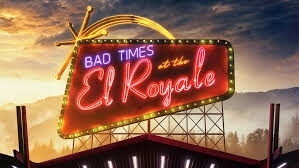Drew Goddard turns his dial to “noir” in the twisty crime thriller Bad Times At The El Royale

Film noir was born in the shadows. But as has been proven innumerable times over the last half-century or so of crime cinema, twisting tales of underworld intrigue can unfold anywhere, from the rain-soaked streets of New York City to the formica tables at a kitschy midcentury diner. The undisputed king of that latter mode is, of course, Quentin Tarantino, whose influence can be felt not only in the setting of writer-director Drew Goddard’s latest, Bad Times At The El Royale, but in the way the film weaves soul music (and one pointedly placed Deep Purple song) into its DNA. You can also feel it in the dialogue scenes, which blend high stakes and mundane chatter with a sarcastic flair reminiscent of the Pulp Fiction director’s early work.
But Goddard is a different sort of postmodernist than Tarantino. He’s less concerned with pastiche than breaking noir down to its individual elements, rearranging them, and putting them back together again. That being said, unlike the director’s debut feature The Cabin In The Woods, Bad Times At The El Royale isn’t a deconstruction of the neo-noir genre so much as a structurally ambitious example of same. In short: It’s Drew Goddard all right, being as reverent as he can ever be. But while his signature approach brings a distinct (and welcome) flash of wit to the proceedings, it also exposes the film’s weaknesses.
We open with a long, unbroken time-lapse shot of a nameless man in a three-piece suit (Nick Offerman) pulling up the floorboards of a wood-paneled ’50s motel room and stashing a briefcase underneath. Fast-forward 10 years to the late ’60s/early ’70s and the lobby of the El Royale, a once-trendy, now practically abandoned midcentury motel straddling the Nevada/California state line. The El Royale is bisected by a thick red line painted right down the center of the lobby, indicating which half of the motel is in California and which half is in Nevada. (Rooms in California cost a little bit extra.) At the end of the line is a glowing yellow jukebox, its curves as sensual as the fins on a 1959 Cadillac Eldorado. This ominously placed gadget serves as the unofficial timekeeper of the piece, the clank of quarters falling down its slot and the click of records falling into place serving as deftly executed sub-markers within the various chapters of the fractured storyline.
Standing in the lobby is a mismatched group of strangers: We’ve got gregarious good old boy/vacuum-cleaner salesman Laramie Seymour Sullivan (Jon Hamm); road-weary priest Father Daniel Flynn (Jeff Bridges); struggling soul singer Darlene Sweet (Cynthia Erivo); and irritable hippie chick Emily Summerspring (Dakota Johnson), who signs the ledger meekly offered up by sole employee Miles (Lewis Pullman) with a defiant “fuck you.” Two of these strangers are not who they say they are, and another has big trouble on their tail.
 Keep scrolling for more great stories.
Keep scrolling for more great stories.
